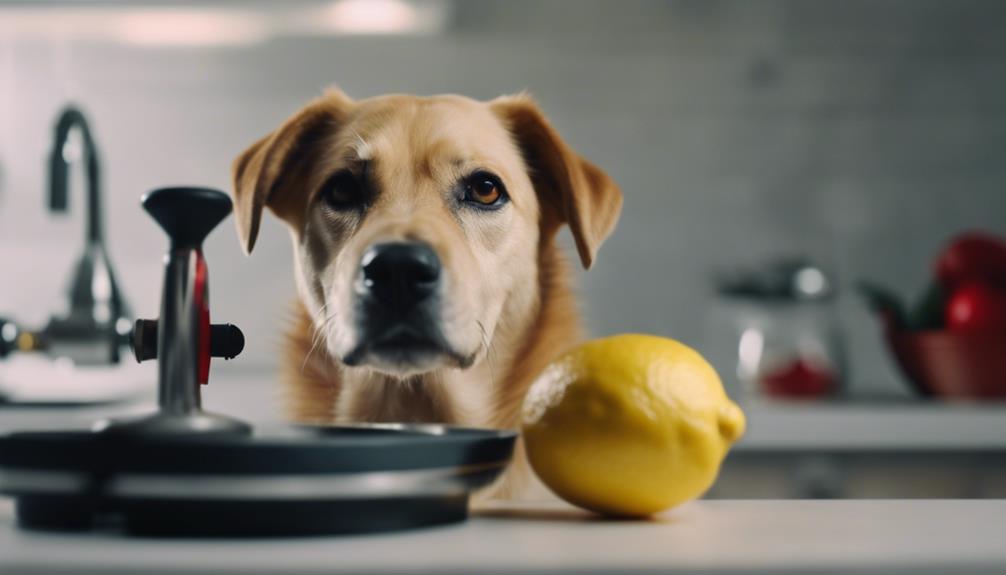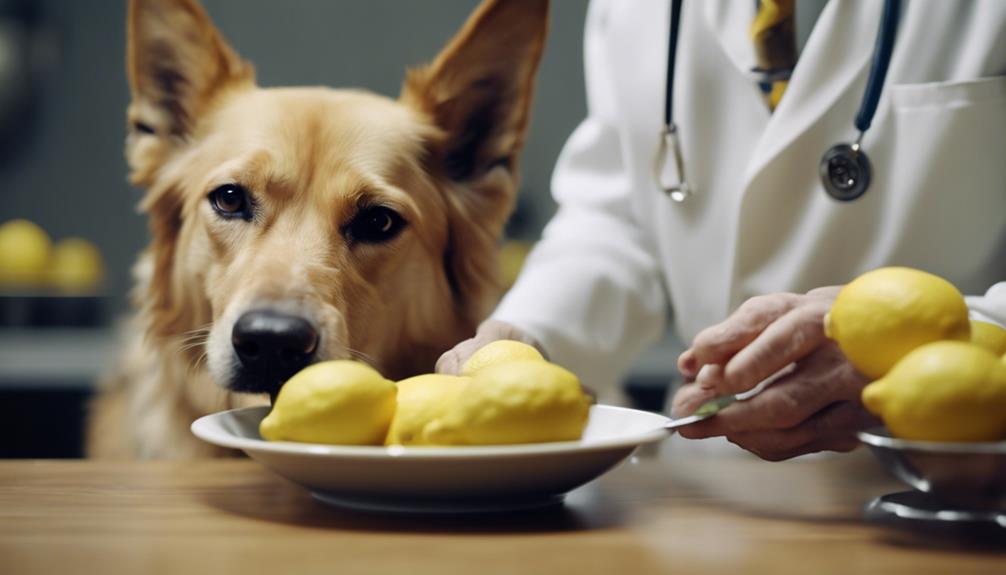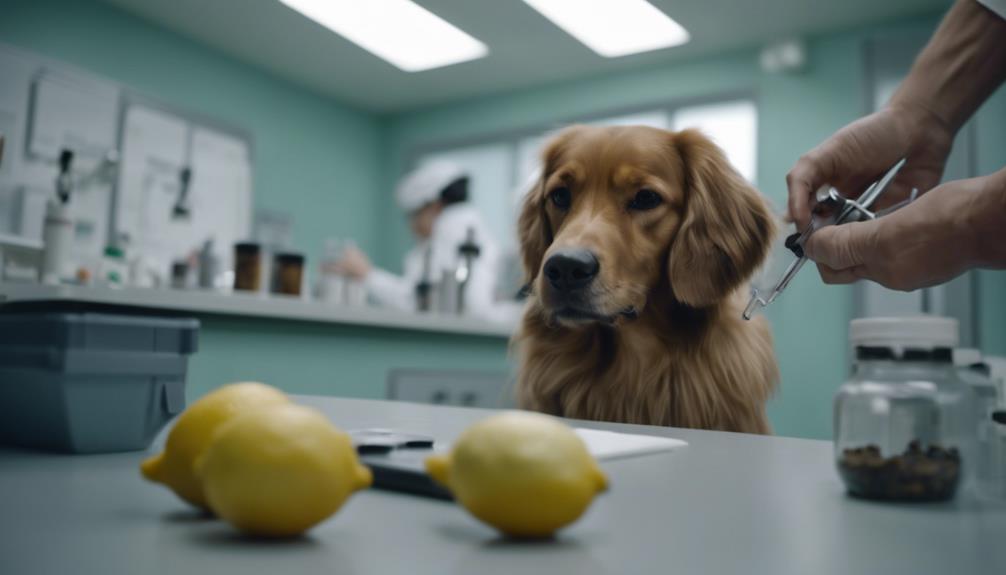With the growing trend of incorporating natural foods into our pets' diets, the question of whether dogs can consume lemons arises. As a staple in many households, lemons exude a tangy appeal, but their interaction with canine physiology unveils a different narrative.
Understanding the intricate reasons behind why dogs should steer clear of lemons goes beyond mere caution; it delves into a realm of potential health hazards that every pet owner should be aware of.
Stay tuned to uncover the compelling insights from a veterinarian's perspective on why the canine world and lemons should maintain a safe distance.
Key Takeaways
- Lemons contain toxic compounds that can cause upset stomach and blockages in a dog's gut.
- Lemon juice and oil are harmful to dogs, leading to digestive issues and skin irritation.
- Immediate veterinary contact is crucial if a dog consumes lemons for appropriate treatment.
- Opt for safer fruit options like apples and bananas, avoiding citrus fruits for dogs' health.
Potential Dangers of Lemons for Dogs
Exposure to lemons poses potential risks to dogs due to the toxic compounds present in these citrus fruits. While lemons are not typically deadly to dogs in small amounts, they contain substances such as citric acid and psoralen that can be harmful.
Citric acid in lemons may lead to gastrointestinal issues like upset stomach, vomiting, and diarrhea in dogs. Moreover, ingestion of lemon rinds can result in gut blockages, which necessitate immediate veterinary attention. Lemon juice and oil also harbor harmful components that can cause serious digestive disturbances and skin irritations in dogs.
Therefore, it is crucial for pet owners to be cautious and prevent their dogs from consuming lemons or products containing lemon extracts to safeguard their well-being.
Toxic Compounds in Lemons
Lemons contain toxic compounds that pose potential risks to dogs' health. Citric acid, found in high concentrations in lemons, can lead to gastrointestinal issues like upset stomach, vomiting, and diarrhea when ingested by dogs. Additionally, psoralen, a compound present in the peel and seeds of lemons, can be toxic to dogs and may result in more severe symptoms if consumed.
It's essential for dog owners to be cautious about their pets' access to lemons and lemon-containing products to prevent any adverse effects from these harmful compounds. Monitoring dogs closely and seeking veterinary advice in case of ingestion can help prevent any serious health issues related to the toxicity of these compounds.
Effects of Citric Acid on Dogs

Citric acid, a common component in lemons and other citrus fruits, can have adverse effects on dogs' digestive systems and overall health. The ingestion of citric acid by dogs can lead to:
- Upset stomach
- Vomiting
- Diarrhea
These symptoms may vary in intensity depending on the amount of citric acid consumed and the individual dog's sensitivity.
It is crucial to monitor your dog's access to citrus fruits and products containing citric acid to prevent potential digestive issues and discomfort. If you suspect your dog has ingested citric acid or is showing any concerning symptoms, seek veterinary advice promptly for appropriate management.
Risks of Lemon Rinds for Dogs
Given the potential adverse effects of citric acid on dogs, it is essential to understand the specific risks associated with the ingestion of lemon rinds by our canine companions. Lemon rinds pose a choking hazard and can lead to gastrointestinal obstructions in dogs. The sharp and tough texture of the rind can cause tears or blockages in the digestive tract, requiring immediate veterinary intervention. To highlight the risks further, consider the following table:
| Potential Risks of Lemon Rinds for Dogs |
|---|
| Choking hazard |
| Gastrointestinal blockages |
| Irritation of the digestive tract |
| Risk of tears in the digestive system |
| Emergency veterinary care may be needed |
It is vital to keep lemon rinds away from dogs to prevent these serious complications.
Harmful Substances in Lemon Juice

Harmful substances present in lemon juice can pose significant risks to the health of dogs when ingested. These substances include:
- Citric acid: May lead to upset stomach, vomiting, and diarrhea.
- Psoralen: Can cause photosensitivity reactions and skin issues.
- Essential oils: Such as limonene and linalool, which are toxic to dogs.
It is crucial to keep lemon juice away from dogs to prevent these potential health hazards.
In the next subtopic, we will explore the impact of lemon oil on dog health and further reasons why dogs should steer clear of lemons altogether.
Lemon Oil and Dog Health
Lemon oil can have adverse effects on the health of dogs when ingested or applied topically. Ingesting lemon oil can lead to gastrointestinal upset, including symptoms like vomiting and diarrhea. Similarly, applying lemon oil to a dog's skin can cause irritation and discomfort. The potent nature of lemon oil, often used in aromatherapy or as a cleaning agent, can be overwhelming for dogs due to their sensitive sense of smell. Here is a breakdown of the potential risks associated with lemon oil for dogs:
| Risk Factors | Effects | Precautions |
|---|---|---|
| Gastrointestinal | Vomiting, diarrhea | Keep lemon oil out of reach |
| Skin Irritation | Itching, redness | Avoid topical application |
| Respiratory | Respiratory distress | Prevent inhalation |
Managing Lemon Consumption in Dogs

To effectively address the ingestion of lemons by dogs, prompt action and consultation with a veterinarian are essential. Dogs may accidentally consume lemon-based foods, prompting the need for immediate attention.
When managing lemon consumption in dogs, consider the following:
- Contact your veterinarian immediately if your dog consumes lemon.
- Treatment will vary based on the amount ingested and the dog's overall health.
- Veterinarians may recommend inducing vomiting to prevent potential toxicity.
Immediate Actions if Dog Eats Lemon
After consulting with a veterinarian regarding the ingestion of lemons by dogs, immediate actions should be taken if a dog consumes this citrus fruit to ensure the safety and well-being of the pet.
If a dog eats a lemon, the first step is to contact a veterinarian or a pet poison helpline immediately. It is crucial to provide the vet with information such as the amount of lemon ingested, the dog's weight, and any symptoms observed.
While waiting for professional guidance, it may be recommended to induce vomiting if the ingestion occurred recently. However, it is essential to never induce vomiting without consulting a veterinarian first, as this can be harmful in certain situations.
Time is of the essence in these situations, so prompt action is crucial to prevent any potential complications.
Treatment Options for Lemon Ingestion

When addressing lemon ingestion in dogs, veterinarians may recommend appropriate treatment measures based on the specific circumstances and severity of the situation. Immediate actions such as inducing vomiting or administering activated charcoal might be necessary to prevent further absorption of harmful compounds. Additional treatment options may include supportive care to manage symptoms like gastrointestinal upset or dehydration. It's crucial to seek professional guidance promptly to ensure the best possible outcome for your furry friend.
Treatment Options:
- Inducing vomiting to remove any remaining lemon in the stomach.
- Administering activated charcoal to help absorb toxins.
- Providing supportive care to manage symptoms like vomiting and diarrhea.
Citrus Fruits and Dog Health
Citrus fruits pose potential risks to the health of dogs due to the presence of harmful compounds like citric acid and psoralen. These compounds can be harmful to the digestive system and liver of dogs when ingested.
Citric acid, commonly found in citrus fruits, can lead to gastrointestinal issues such as upset stomach, vomiting, and diarrhea in dogs. Furthermore, psoralen, another compound present in citrus fruits, can cause photosensitivity and skin issues in dogs.
To ensure the well-being of your canine companion, it is recommended to avoid feeding them citrus fruits. Instead, opt for safer fruit options like apples and bananas as occasional treats, while also considering the moderation in fruit consumption to prevent weight gain in dogs.
Optimal Fruit Treats for Dogs

Considering the potential risks associated with citrus fruits for dogs, it is imperative to explore optimal fruit treats that are safe and beneficial for canine consumption.
When choosing fruit treats for your furry friend, consider the following options:
- Apples: Rich in vitamins A and C, as well as fiber, apples make a crunchy and tasty treat for dogs.
- Bananas: High in potassium and low in sodium, bananas are a healthy and energy-boosting fruit for dogs.
- Blueberries: Packed with antioxidants and phytochemicals, blueberries are a delicious and nutritious option for dogs.
These fruits not only provide essential nutrients but also offer a safe alternative to citrus fruits, promoting your dog's overall well-being.
Human Foods to Avoid for Dogs
It is crucial for pet owners to be aware of human foods that are harmful and should be avoided when it comes to their dogs' diet.
While apples and bananas are safe fruit options for dogs, avocados and almonds should be avoided due to potential toxicity. Corn can be given in moderation. However, it is essential to steer clear of chocolate and grapes as they are dangerous for dogs and can lead to severe health issues.
Opting for carrots and broccoli as alternatives to citrus fruits is advisable, as they are safer for canine consumption. Maintaining a diet free of harmful human foods is vital for the well-being and health of dogs, ensuring they live a happy and healthy life.
Conclusion
In conclusion, it is crucial for pet owners to be aware of the potential dangers that lemons pose to dogs. The toxic compounds found in lemons, including citric acid and harmful substances, can have adverse effects on dogs' health.
By understanding the risks associated with lemon ingestion and implementing prudent management strategies, pet owners can help safeguard their canine companions and promote their overall well-being.
It is best to err on the side of caution and keep lemons away from dogs to ensure their safety.




